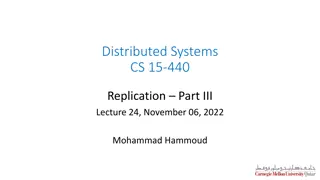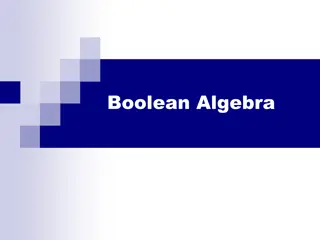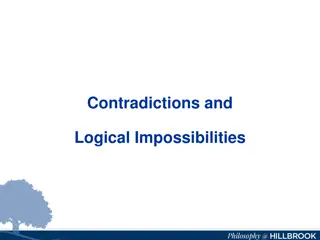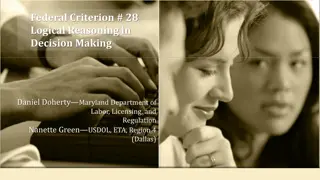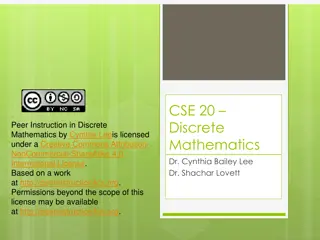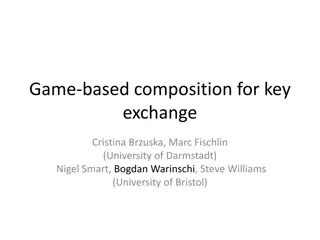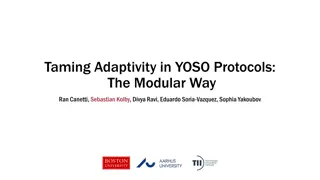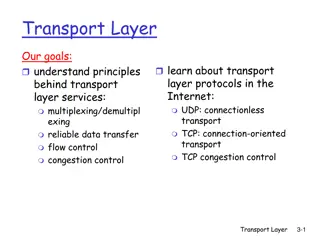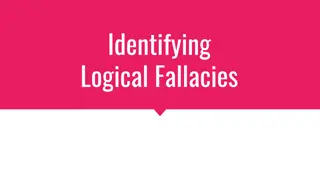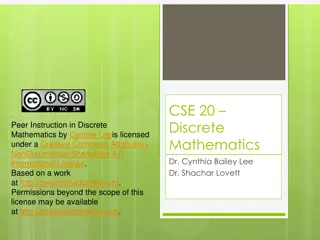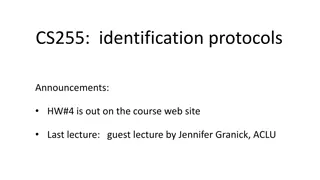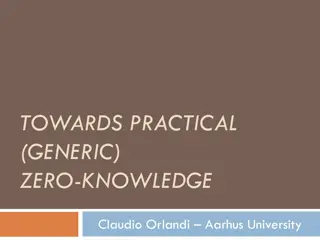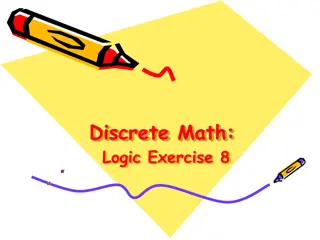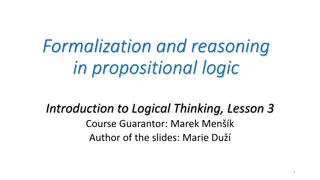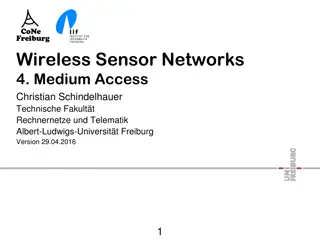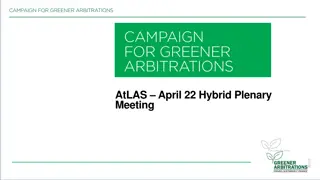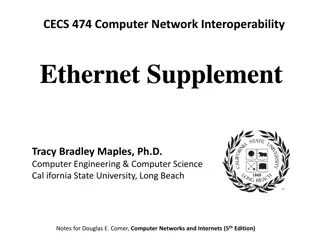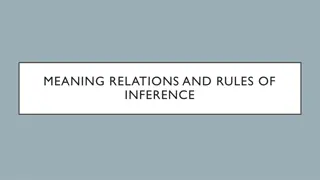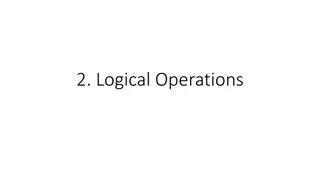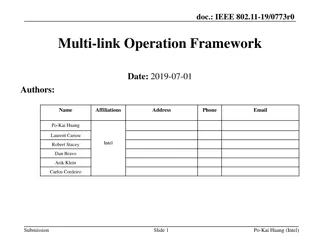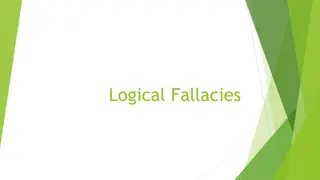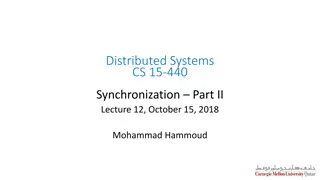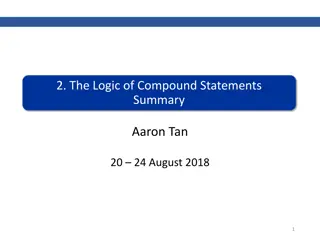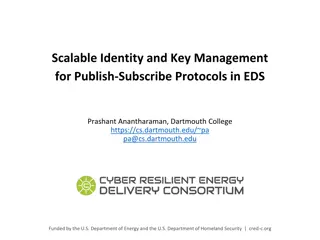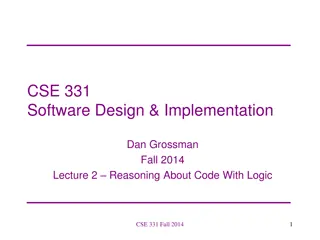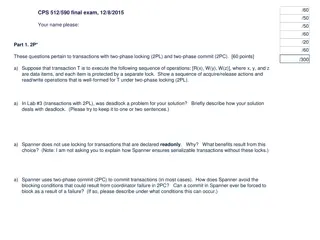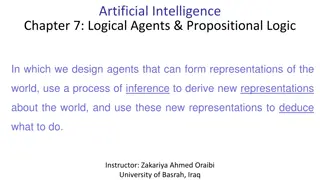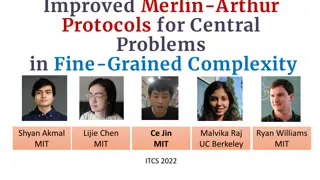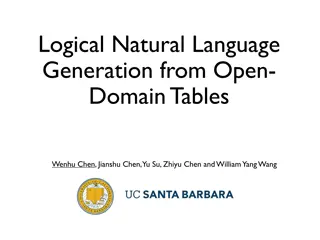Understanding Logical Form and Equivalence in Conditional Statements
Delve into the intricacies of logical form, equivalence, and compound statements in the realm of propositional logic. Explore valid and invalid arguments, conditional statements, and the logic of compound statements with puzzles to sharpen your logical reasoning skills. Unravel scenarios like determ
2 views • 81 slides
Update on SWAG Protocols and New NICE TA Progress Report
Kate Gregory leads the SWAG Protocols update for March 2024, with advancements in new protocols and NICE TA updates. A comparison of activities from Oct 2023 to Mar 2024 shows progress in issuing, reviewing, and drafting protocols. The latest NICE TA additions include treatments for advanced cancers
5 views • 13 slides
Understanding Consistency Protocols in Distributed Systems
Today's lecture covers consistency protocols in distributed systems, focusing on primary-based protocols and replicated-write protocols. These protocols play a crucial role in ensuring consistency across multiple replicas. One example discussed is the Remote-Write Protocol, which enforces strict con
0 views • 35 slides
Logical Expressions and Symbolism in Sentential Logic
Understanding sentential logic, logical expressions, and symbols through examples of logical reasoning and inference. Explore the concepts of logical OR, AND, negation, and the complexities of inclusive and exclusive logic in various scenarios.
1 views • 33 slides
Understanding Boolean Algebra and Logical Statements
Introduction to Boolean algebra, logical statements, and compound statements. Explore the concepts of Boolean variables, logical operators, writing conventions, equivalence in Boolean algebra, and truth tables. Learn how to analyze and evaluate logical expressions using truth tables.
1 views • 25 slides
Exploring Contradictions and Logical Impossibilities
Explore a series of paradoxes and logical puzzles, ranging from being in two places at once to time travel conundrums. Discover the concept of contradictions and logical impossibilities through thought-provoking scenarios and riddles. Dive into the realm of impossibilities and challenge your underst
1 views • 6 slides
Enhancing Logical Reasoning in Decision Making Process
Federal Criterion #28 emphasizes the importance of stating logical reasons for decisions that align with findings of fact and conclusions of law. This criterion is key to ensuring fairness and accuracy in legal analysis. The scoring criteria, national appeals review results, and ways to improve scor
1 views • 8 slides
Understanding Boolean Algebra and Logical Statements
Boolean Algebra allows for formalizing logical reasoning using variables that can be either true or false. It involves logical statements, compound expressions, logical operators like AND, OR, NOT, writing conventions, equivalence, and truth tables to determine the truth values of statements. By und
0 views • 25 slides
Understanding Logical Connectives in Discrete Mathematics
Explore the world of propositional logic and truth tables in discrete mathematics through a peer-instruction approach. Learn about basic logical connectives, new connectives, complex formulas, operator precedence, and the nuances of implication (implies) with engaging examples. Delve into scenarios
0 views • 14 slides
Understanding Propositional Logic and Logical Operators
Learn about propositional logic, statements, logic operators, compound statements, exclusive-or, logical equivalence, and writing logical formulas for truth tables. Explore how to create compound statements for exclusive-or using different approaches and ensure logical equivalence. Enhance your know
0 views • 26 slides
Secure Composition of Key Exchange Protocols
Explore the game-based composition approach for key exchange protocols, focusing on ensuring security in compositions with arbitrary tasks and the universal composability of protocols. Delve into the Bellare-Rogaway security model and the details of security games in protocol analysis. Understand ke
0 views • 25 slides
Taming Adaptivity in YOSO Protocols: The Modular Way
Explore the concept of taming adaptivity in YOSO protocols through a modular approach. The research delves into the efficiency, adversary adaptivity, role assignments, and compiler models in synchronous YOSO protocols. The visual presentations illustrate the framework, challenges, and strategies in
0 views • 19 slides
Understanding Logical Relations in Programming Languages
Explore the concept of logical relations in programming languages, focusing on the relation between high-level and low-level programs. Learn about contextual equivalence, its benefits and limitations, and how logical relations offer a robust framework for defining program equivalence. Discover why l
0 views • 18 slides
Understanding Laws of Logic and Logical Reasoning
Laws of logic play a crucial role in reasoning and making deductions. This comprehensive guide explains the use of contrapositives, examples of conditional statements, and the significance of laws like the Law of Syllogism. Understanding these principles helps in effectively analyzing statements and
0 views • 8 slides
Introduction to Symbolic Logic: Understanding Logical Inferences
Logic is the study of reasoning methods to distinguish between correct and incorrect arguments. Symbolic Logic involves representing logic symbolically for easier understanding and manipulation. Logical inferences help in making decisions based on reasoning chains. The content discusses the use of l
1 views • 28 slides
Understanding Internet Transport Layer Services and Protocols
In the realm of networking, exploring the principles of transport layer services is crucial. This involves concepts like multiplexing/demultiplexing, reliable data transfer, flow control, and congestion control, which are facilitated by protocols such as UDP and TCP. The transport layer acts as a br
0 views • 56 slides
Identifying Logical Fallacies in Sources: Presentation Assignment
Learn to identify logical fallacies in various sources by analyzing passages and applying the Logical Fallacy Referee tool. Work in pairs to select sources, identify fallacies, and present annotated examples to the class.
0 views • 7 slides
Peer Instruction in Discrete Mathematics
Explore the world of discrete mathematics with Dr. Cynthia Bailey Lee and Dr. Shachar Lovett through peer instruction. Dive into topics like step-by-step equivalence proofs and the equivalence of logical operators. Discover the different methods to show propositions are equivalent and delve into log
0 views • 14 slides
Overview of Identification Protocols in CS255 by Dan Boneh
The lecture in CS255 covers various topics related to identification protocols, including signatures from trapdoor functions, certificates, revocation methods, certificate issuance problems, defense mechanisms like certificate transparency (CT), and moving on to protocols. The talk also explores the
0 views • 43 slides
Towards Practical Generic Zero-Knowledge Protocols
Exploring the evolution of zero-knowledge protocols, this presentation by Claudio Orlandi from Aarhus University delves into the concepts of Zero-Knowledge from Garbled Circuits, Privacy-Free Garbled Circuits, and more. The talk discusses efficient methods for proving statements and touches on relat
0 views • 29 slides
Propositions and Logical Connectives Exercise Solutions
In this exercise, propositions involving grizzly bears, hiking safety, and ripe berries are formulated using logical connectives. Solutions are provided for various scenarios including conjunctions, conditionals, biconditionals, and more. The explanations offer a structured approach to understanding
0 views • 6 slides
Introduction to Propositional Logic: Formalization and Reasoning
Understanding formalization in propositional logic involves replacing atomic propositions with propositional variables and natural language connectives with logical connectives. The process abstracts from internal proposition structure, reducing meaning to True or False. The language allows formaliz
0 views • 18 slides
The Logical Structure of Classical and Quantum Mechanics
The paper explores the common logical structure shared between classical and quantum mechanics, emphasizing the non-distributive lattice embedded in a distributive one. It discusses how all physical theories must adhere to this structure, incorporating topology, Heyting algebra, Boolean algebra, and
1 views • 36 slides
Wireless Sensor Networks: Medium Access Protocols Overview
This collection of images presents key concepts in wireless sensor networks, focusing on medium access protocols, the ISO/OSI reference model, types of conflict resolution, contention-free protocols, Bitmap protocol, ALOHA algorithm, and its analysis and efficiency. Various protocols and algorithms
0 views • 83 slides
Green Protocols for Greener Arbitrations
The Green Protocols introduced by AtLAS aim to guide the arbitration community in committing to environmentally sustainable practices. These protocols suggest ways to reduce carbon emissions, energy consumption, waste generation, and unnecessary travel by utilizing electronic communication, video co
0 views • 14 slides
Introduction to Logical Thinking in Computer Science at VSB - Technical University of Ostrava
This course introduces the concept of logical thinking in Computer Science at VSB - Technical University of Ostrava. Topics include valid arguments, deductive reasoning, and the science of correct reasoning. Requirements for passing the course include written tests and exams with specified grade ran
0 views • 18 slides
Understanding Ethernet and Multiple Access Protocols in Computer Networks
Exploring the fundamentals of Ethernet and multiple access protocols in computer networks, this content discusses the two primary categories of multiple access protocols - contention access and controlled access. It delves into topics such as CSMA/CD, LANs, performance of multiple access schemes, ad
0 views • 7 slides
Understanding Meaning, Relations, and Rules of Inference in Logic
Exploring the concept of meaning, relations, and rules of inference in logic through the use of truth tables to evaluate logical formulas. Discover how tautologies and contradictions are identified, and how logical operators influence the truth values of propositions. Delve into examples that showca
0 views • 24 slides
Understanding Logical Operations and Their Applications
Logical operators such as AND, OR, NOT, and XOR play a crucial role in programming and control systems. They are used to combine logical expressions and make decisions based on certain conditions. By utilizing truth tables, these operators help in solving problems efficiently. This article explores
0 views • 24 slides
IEEE 802.11-19/0773r0 Multi-link Operation Framework Summary
The document discusses the multi-link operation framework for IEEE 802.11-19/0773r0, focusing on load balancing and aggregation use cases. It introduces terminology related to multi-link logical entities and provides examples of multi-link AP and non-AP logical entities. The framework considers stee
0 views • 16 slides
Understanding Logical Fallacies: Common Types and Examples
Logical fallacies are errors in reasoning that can undermine the validity of arguments. This content covers various types of fallacies such as circular logic, either/or fallacy, oversimplification, overgeneralization, stereotyping, and ad hominem attacks. Examples and explanations are provided for e
0 views • 16 slides
Understanding Distributed System Synchronization and Logical Clocks
Continuing from the previous lecture on time synchronization, this session delved into logical clock synchronization, mutual exclusion, and election algorithms in distributed systems. Logical clocks, such as Lamport's Clock and Vector Clock, play a crucial role in defining the order of events withou
0 views • 33 slides
Understanding Compound Statements in Logic
The summary discusses the logic of compound statements, covering logical form, equivalence, tautologies, contradictions, conditional statements, valid and invalid arguments, and more. It explains the definitions of statements, negation, conjunction, disjunction, statement form, logical equivalence,
0 views • 12 slides
Scalable Identity and Key Management for Publish-Subscribe Protocols
This research by Prashant Anantharaman from Dartmouth College focuses on scalable identity and key management for publish-subscribe protocols in Energy Delivery Systems. It discusses the architecture, goals, assumptions, and implementation results in the context of PKI vs. Macaroons protocols. The w
0 views • 37 slides
Logical Reasoning in Software Design and Implementation
Logical reasoning in software development involves determining the truth of facts as a program runs under specific assumptions. This process complements testing by allowing programmers to reason about classes of inputs/states and verify program correctness. Hoare Logic is introduced as a method for
0 views • 35 slides
Comprehensive Examination Questions on Data Management Systems and Security Protocols
This content covers a range of topics related to data management systems, including two-phase locking and two-phase commit protocols, Bayou system with vector clocks and causality, digital signatures and certificates in protocols, and authentication protocols. Questions include scenarios and concept
0 views • 6 slides
Understanding Logical Agents and Propositional Logic in AI
Designing logical agents involves forming representations of the world, using inference for deriving new insights, and deducing actions based on these representations. Knowledge Base (KB) is a crucial component, comprising known facts and current percepts to infer hidden states. Propositional logic,
0 views • 23 slides
Introduction to Logical Thinking: Science of Correct Reasoning
Logic, the science of correct reasoning, explores ways to infer conclusions from assumptions and validate arguments. This course introduces logic as a tool for analyzing arguments, automating processes, and enhancing communication clarity. Through classic logic variants like propositional and predic
0 views • 30 slides
Improved Merlin-Arthur Protocols for Fine-Grained Complexity Problems
The text discusses Merlin-Arthur proof systems and protocols for central problems in fine-grained complexity, particularly focusing on the time complexity, completeness, and soundness of these protocols. It also touches on recent interest in these protocols and presents new results in areas such as
0 views • 16 slides
Advancements in Logical Natural Language Generation from Open-Domain Tables
Cutting-edge research in logical natural language generation (NLG) is transforming the field by moving beyond traditional surface realization to generate summarized text, conclude trends, and apply logical and mathematical operations. By addressing limitations such as lack of logical inference, summ
0 views • 33 slides


